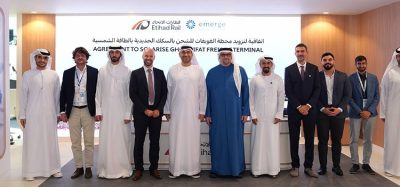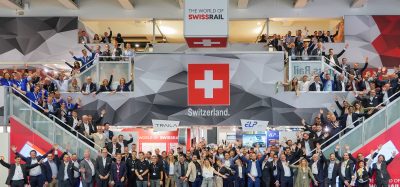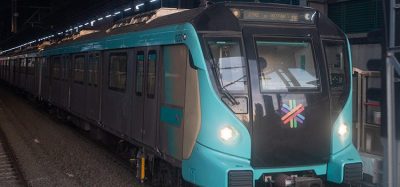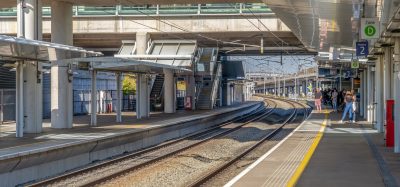DB developing emission-free ammonia-hydrogen engine
Posted: 10 October 2022 | Elliot Robinson (Editorial Assistant - Global Railway Review) | No comments yet
DB are cooperating with FFI to develop a new emission-free ammonia-hydrogen technology to replace conventional diesel engines.
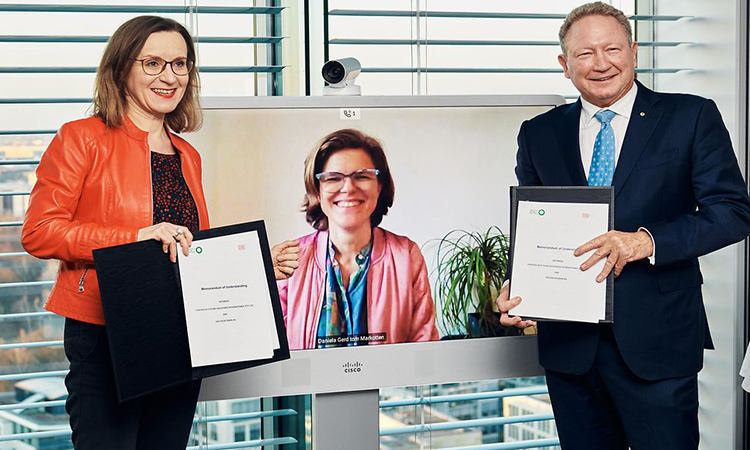

Deutsche Bahn (DB) and Fortescue Future Industries (FFI) signing a Letter of Intent for the technology - Credit: DB
It has been announced that Deutsche Bahn (DB) and the Australian energy company Fortescue Future Industries (FFI) have agreed on a comprehensive cooperation to promote climate-neutral mobility.
Both partners, having signed a corresponding Letter of Intent, are working on modifying diesel engines for locomotives and traction vehicles so that they can be operated with ammonia and hydrogen. In addition to the development of emission-free propulsion technologies, the agreement is also for cooperation in logistics and supply chains for green fuels.
“We are saying goodbye to diesel and relying on the latest technologies, including the ammonia-hydrogen engine” Dr. Daniela Gerd tom Markotten, DB Board Member for Digitisation and Technology, said. “This innovative engine makes it possible to continue operating existing diesel vehicles without emissions. By 2040, DB will be completely climate-neutral.”
“Climate-neutral mobility starts with green supply chains on the railways,” Dr. Sigrid Nikutta, DB Board Member for Cargo, said. “Today we can already transport hydrogen in liquid form in conventional tank wagons, but our goal is to develop further logistics solutions for hydrogen, because rail is the most climate-friendly form of transport.”
“We know that cutting edge technology and real-world solutions are key to addressing climate change which is why Fortescue is partnering with Deutsche Bahn,” Dr. Andrew Forrest, Founder and Chairman of the Board of FFI, said. “Together, FFI and DB will work to reduce global emissions given the urgency to find new ways to replace fossil fuels in the transport industry.”
Related news you will enjoy:
DB Group returns to profitable business
Siemens and DB test hydrogen train and mobile fuelling station for first time
The ammonia-hydrogen engine is based on an existing type of diesel engine which has been modified so that it can run on green ammonia and green hydrogen. The advantage over a pure hydrogen engine is that ammonia has a higher energy density than liquid hydrogen and is easier to transport and store.
The key technology of the ammonia-hydrogen engine is a cracker from the Stuttgart-based company Ammonigy. This cracker splits a small part of the ammonia outside the engine into hydrogen and nitrogen. The hydrogen is then mixed with the remaining ammonia as an ignition gas, ensuring CO2-free combustion. Together with FFI, DB is developing this technology further, including endurance tests and emission measurements. In total, both companies are investing a mid-six-figure sum in the development project.
The cooperation also focuses on the potential for green supply chains of hydrogen and ammonia, i.e. the production, transport and distribution of both energy carriers. FFI wants to produce hydrogen in large quantities and distribute it globally in the form of green ammonia. DB is currently testing a variety of solutions for the use of hydrogen. At the same time, the DB subsidiary DB Cargo is currently developing efficient and green logistics concepts to bring hydrogen and hydrogen derivatives such as ammonia to industry.
Related topics
Diesel Locomotives, Hydrogen Trains, Regulation & Legislation, Sustainability/Decarbonisation, Technology & Software, The Supply Chain
Related organisations
DB Cargo, Deutsche Bahn AG (DB AG), Fortescue Future Industries (FFI)




